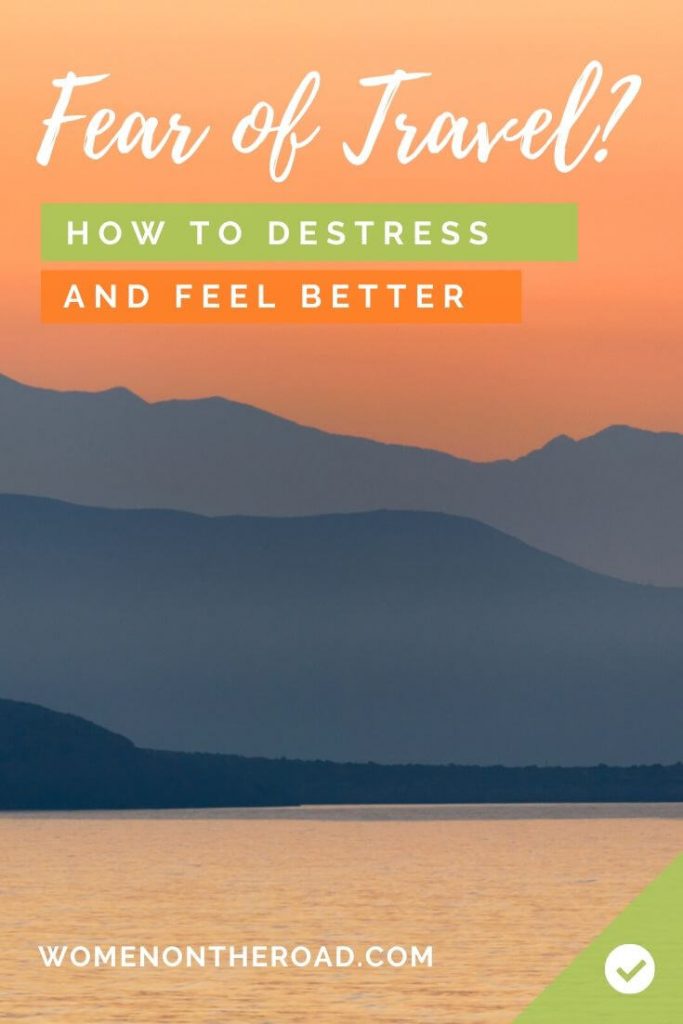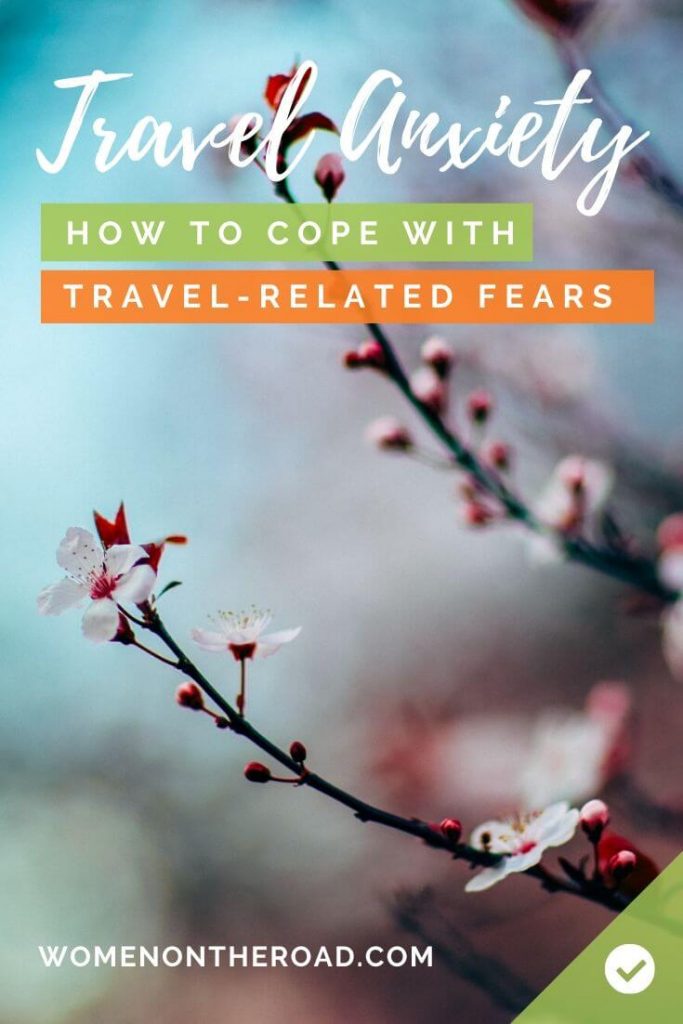Are you prone to travel phobias? Does your heart go into lockdown when the plane doors are closed? Do you hide in the next room if a spider crawls across the floor? Do you get dizzy just thinking of mountains?
DISCLAIMER: I am a writer, not a doctor, and none of this is medical advice. I have traveled for 50 years to nearly 100 countries and have gained some experience on what works or doesn’t work for me. I share that experience in this series of articles, which can be your starting point for research. But when it comes to actual prevention, treatment and care, ALWAYS consult a qualified medical practitioner.
If the answer is yes to any of these, you may suffer from one of these phobias. If you love travel, that can be a real blow.
Millions of people suffer from these anxieties, and they avoid driving, flying and many other travel-related activities because of these fears – not to mention the various phobias related to insects, animals, other creepy crawlies and flying things we inevitably find on the road.

SOME COMMON TRAVEL PHOBIAS
As I started researching this article, I was amazed at the sheer number of travel-related phobias or types of travel anxiety – some I’d never heard of. Still, it goes to show just how many fears we have (and how badly we need to deal with them if we are to travel with serenity). Here are some of the main ones.
- Acrophobia: fear of heights
- Aerophobi or Aviophobia: fear of flying
- Agoraphobia: fear of open or unfamiliar places
- Agrizoophobia: fear of wild animals
- Anthropophobia: fear of people
- Aquaphobia: fear of water
- Arachnophobia: fear of spiders
- Claustrophobia: fear of enclosed spaces
- Cynophobia: fear of dogs
- Emetophobia: fear of vomiting
- Enochlophobia or Demophobia: fear of crowds
- Entomophobia: fear of insects
- Food neophobia: fear of new or different foods
- Gephyrophobia: fear of bridges
- Hodophobia: fear of travel
- Mysophobia, Germophobia or bacteriophobia: fear of germs
- Ophidiophobia: fear of snakes
- Thalassophobia: fear of the sea or ocean
- Zoophobia: fear of animals (especially dangerous ones)
See how many of these fears can be related to travel? From crossing a bridge to get to the airport to flying in a plane to encountering critters in a rainforest, the opportunities for fear are plentiful.
Since I’m not a health practitioner, I won’t delve into the medical aspects of any of this. However, my personal experience may be of help to you.
Sometime in my twenties, I developed an irrational fear – I became scared of flying. I’d been flying since I was a baby and loved it, so I have no idea what caused it. I just woke up one day with this terrible sense of foreboding that my next plane was going to crash. And when it didn’t, I simply assumed I’d miscalculated and that the next one would be ‘it’. It is now a number of years later, and many many flights.
Adding insult to injury I wasn’t satisfied with one – I needed two travel-related phobias! I became afraid of heights, and for someone who loves the mountains I can tell you this was not welcome.
So how do you deal with these phobias? Does that mean you’re doomed to stay home?
Not at all. There are remedies, some simple, some long-term and more complex, but most of these phobias can be, at the very least, managed. Here’s how.
Traditional therapy
The most common approach to phobias is traditional therapy. I tried this with my own fears – I thought something must have happened, buried deep in my subconscious, that provoked these travel phobias so I signed up for a series of sessions with a therapist to deal with my fears. Unfortunately, we were unable to unearth the source of my anxieties.
Hypnotherapy
Significantly more successful was hypnotherapy, which uses hypnosis to relax you deeply. After a few sessions, I was taught to relax myself and would do my exercises before walking at altitude. It really did help minimize the fear, converting it from terror-level to merely very afraid.
However, I eventually quit my hypnotherapy sessions because in the end, I relaxed so much I fell asleep!
EFT
I finally found a solution to my fear of heights. My partner was at the time practising EFT, or Emotional Freedom Technique, which you can learn for free online. All you do is tap lightly on your face and say some words (I’m obviously oversimplifying!) and if you do this regularly enough, those travel phobias will disappear. I still don’t adore heights, but I’m no longer immobilized. I’ve also used this technique before going onstage or speaking in public – that oppressive feeling in my chest disappeared.
Fear of flying course
As for my fear of flying, that’s gone too. I tried a number of courses and I actually failed one course – although how you can fail a course like this was beyond me AND the instructors. But then I found this course – and it worked!
Don’t stress it!
One course that has helped me immensely for all fears and phobias is Don’t Stress It, an eight-part course delivered via email. A few years ago I was planning a major trip to Central Asia and those nasty forebodings hit again. By now, though, I knew they were irrational – all I needed was to find the right tool to work them through.
Enter my friend Mariana Calleja, MD, a doctor-turned-blogger and traveler, who understood the links between stress and fear and developed a course to deal with anxiety and create healthy habits, getting both your body and your mind into travel-ready shape. She offered to let me road-test it just before it came out and by the time I’d finished the last class, I was fretting to get on that plane, all concerns and worries long gone.
In the mountains of Kyrgyzstan, on that trip to Central Asia, I somehow convinced myself that the road was so narrow my car would magically fly off the edge into the precipice below. The more I thought, the more I stressed. So I did something I learned on the course, something extremely simple that involved getting out of the car for a few seconds. When I boarded again, I could cope. I was still afraid, but the panic attack had subsided.
Now, when I feel stress trying to break in, I try to remember some of those simple lessons. A bit of fear is natural – but deep and possibly life-threatening anxiety is something I’d rather live without.
When you travel, especially solo, you need to rely on your body more than usual. There’s the wear and tear of travel, of course, but there’s also the foreign food and water, and the potential difficulty of finding medical care. Creating healthy habits that keep you serene helps you avoid not only health problems, but the anxiety that can lead to them or result from them.
Stress can also prevent you from thinking properly and affect your judgment, yet making smart decisions is essential during travel. By understanding your anxiety, you can tackle it and prevent it from harming you.
The worst thing you can do is to keep pushing forward while ignoring a travel phobia, or thinking they’ll simply disappear. They won’t. But remember – a genuine fear of something dangerous is not the same as a phobia. If you’re scared of something dangerous – a dark alley, an unguarded ledge on the side of a mountain – then listen to your gut feeling. We’ve been given instinct for a reason.
— Originally published on 31 July 2011
SHOP THIS POST ON AMAZON
PIN THESE PICTURES AND SAVE FOR LATER!







